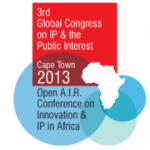 Researchers, scholars and policy specialists from over 40 countries drafted and endorsed a declaration of Fundamental Public Interest Principles for International Intellectual Property Negotiations that are starkly at odds with some trade agreement negotiations.
Researchers, scholars and policy specialists from over 40 countries drafted and endorsed a declaration of Fundamental Public Interest Principles for International Intellectual Property Negotiations that are starkly at odds with some trade agreement negotiations.
The Principles were adopted at the Third Global Congress on Intellectual Property and the Public Interest which met in Cape Town, South Africa December 7-13, 2013. The principles are strongly critical of the process and presumed substance of the negotiation of intellectual property provisions in the ongoing Trans Pacific Partnership (TPP) and US-EU Transatlantic Trade and Investment Partnership (TTIP).
The Principles open with recognition of a “basic tenet” of democratic societies that law-making “should occur only through procedures that are public, inclusive, transparent and accountable so that law can best reflect the values and consent of the governed.” It thus calls for the rejection of any international law on intellectual property that is made through a process not including “ongoing release[s] of proposed legal provisions for public comment.”
Neither the TPP nor TTIP has planned any ability for the public to see or comment on the proposed laws before their drafting is completed. The dormant Anti-Counterfeiting Trade Agreement (ACTA), already rejected by the European Parliament, included only one release of draft text in its multi-year negotiation process. The Principles implicitly demand the rejection of ratification of all three of these agreements for their deficient process.
Notably, the recently completed Marrakesh Treaty to Facilitate Access to Published Works for Persons Who Are Blind, Visually Impaired, or Otherwise Print Disabled (Marrakesh Treaty) did include a process that would adhere to the Principle’s transparency and participation demands – including within the process ongoing releases of text and means for civil society groups to observe and comment on negotiations. Prior statements of the Global Congress called for such an accord on minimum standards on limitations and flexibilities, specifically for access to copyrighted works for people with disabilities.
The Principles define several substantive issues as “fundamental” to the public interest. They admonish negotiators to “fully incorporate and respect the provisions of all multilateral intellectual property instruments that provide flexibility [to] tailor the scope and duration of intellectual property rights, define limitations and exceptions to rights, and that recognize the necessity of regulation.” They specifically call for provisions “permitting all countries to fully avail themselves of all TRIPS Agreement provisions which provide flexibility to define the scope of and limitations to intellectual property and data protections” to promote access to medicines, and for flexibility in digital rights and enforcement provisions to adapt to “technological, social, economic, and cultural change.”
The Principles’ calls for international law to maintain substantial flexibility in intellectual property regulation, particularly on digital rights and access to medicine issues, is directly contrary to the leaked positions of some countries in the TPP negotiation, in particular by proposals by the U.S., most frequently joined with by Japan. The Principles also recognize “efforts of some countries to promote positive proposals” in the TPP. Some of the proposals in the leaked versions of the TPP endorsed by Canada, Chile, New Zealand, Malaysia and Brunei would advance some of the Principles’ substantive calls.
The Principles’ reflect norms included in other major declarations on international intellectual property and the public interest. The Principles specifically reference the Washington Declaration on Intellectual Property and the Public Interest, Max Planck Principles for Intellectual Property Provisions in Bilateral and Regional Agreements, the Public Domain Manifesto and the Europeana Public Domain Charter.
The Global Congress on Intellectual Property and the Public Interest was founded by nearly 200 researchers and policy specialists at American University Washington College of Law, in Washington D.C., August 2011. Subsequent Congresses at Centro de Tecnologia e Sociedade – CTS, FGV DIREITO RIO, Rio De Janeiro, Brazil, 2012, and University of Cape Town, South Africa, 2013 have cumulatively engaged over 650 researchers and policy specialists from over 70 countries around the world. The next Congress will be held in 2015 in Kuala Lumpur hosted by Consumers International and Bangalore, India’s Center for Internet and Society.




